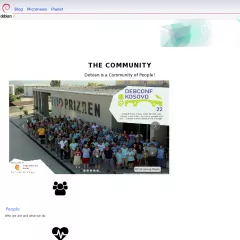Debian 
Debian is used by 0.53% of sites
Official Website
https://debian.orgCategory
Operating Systems
Debian is a free and open-source operating system (OS) that belongs to the Linux family. It is known for its stability, security, and adherence to the principles of free software. Debian is developed and maintained by a worldwide community of volunteers and follows a democratic governance structure.
Here are some key characteristics and features of Debian:
Stability: Debian is known for its strong focus on stability. The project follows a rigorous testing and release process, ensuring that software packages included in the distribution undergo thorough testing to minimize bugs and compatibility issues.
Package Management: Debian uses the Advanced Package Tool (APT) as its package management system. APT allows users to easily install, update, and remove software packages from the Debian repositories. It handles dependencies automatically, simplifying the software management process.
Large Software Repository: Debian provides an extensive collection of software packages through its official repositories. These repositories contain thousands of applications, libraries, and tools that can be installed and used on Debian systems.
Community-Driven Development: Debian is developed by a large community of volunteers from around the world. The community ensures that Debian remains a free and open-source project, and anyone can contribute to its development, maintenance, and support.
Multiple Architectures: Debian supports a wide range of hardware architectures, including popular ones like x86, amd64, ARM, PowerPC, and more. This broad support allows Debian to run on various devices, from personal computers to servers, embedded systems, and even smartphones.
Security and Free Software Philosophy: Debian places a strong emphasis on security and promotes the use of free software. The project follows a strict licensing policy, ensuring that the software included in Debian is open-source and respects users' freedom.
Different Editions and Distributions: Debian offers different editions and distributions to cater to different user needs. The main edition, known as Debian Stable, is targeted at general-purpose computing and emphasizes stability. However, there are also Debian Testing (rolling release), Debian Unstable (development), and specialized editions like Debian Edu (for educational institutions) and Debian Live (for creating live CDs/USBs).
Debian has a reputation for being highly reliable, secure, and customizable. It is widely used as a server operating system, powering numerous web servers, database servers, and other network services. Additionally, many Linux distributions, such as Ubuntu, Linux Mint, and elementary OS, are based on Debian, leveraging its stability and package management system.
Here are some key characteristics and features of Debian:
Stability: Debian is known for its strong focus on stability. The project follows a rigorous testing and release process, ensuring that software packages included in the distribution undergo thorough testing to minimize bugs and compatibility issues.
Package Management: Debian uses the Advanced Package Tool (APT) as its package management system. APT allows users to easily install, update, and remove software packages from the Debian repositories. It handles dependencies automatically, simplifying the software management process.
Large Software Repository: Debian provides an extensive collection of software packages through its official repositories. These repositories contain thousands of applications, libraries, and tools that can be installed and used on Debian systems.
Community-Driven Development: Debian is developed by a large community of volunteers from around the world. The community ensures that Debian remains a free and open-source project, and anyone can contribute to its development, maintenance, and support.
Multiple Architectures: Debian supports a wide range of hardware architectures, including popular ones like x86, amd64, ARM, PowerPC, and more. This broad support allows Debian to run on various devices, from personal computers to servers, embedded systems, and even smartphones.
Security and Free Software Philosophy: Debian places a strong emphasis on security and promotes the use of free software. The project follows a strict licensing policy, ensuring that the software included in Debian is open-source and respects users' freedom.
Different Editions and Distributions: Debian offers different editions and distributions to cater to different user needs. The main edition, known as Debian Stable, is targeted at general-purpose computing and emphasizes stability. However, there are also Debian Testing (rolling release), Debian Unstable (development), and specialized editions like Debian Edu (for educational institutions) and Debian Live (for creating live CDs/USBs).
Debian has a reputation for being highly reliable, secure, and customizable. It is widely used as a server operating system, powering numerous web servers, database servers, and other network services. Additionally, many Linux distributions, such as Ubuntu, Linux Mint, and elementary OS, are based on Debian, leveraging its stability and package management system.